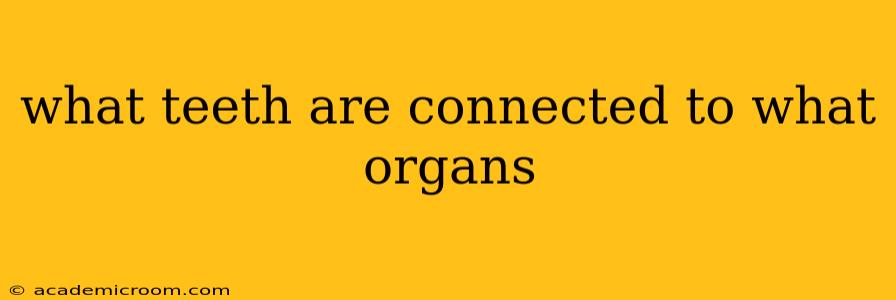What Teeth Are Connected to What Organs?
The concept of specific teeth being directly connected to particular organs is not supported by mainstream medical science. There's no scientifically proven anatomical or physiological link between individual teeth and specific internal organs. However, traditional Chinese medicine and some other holistic practices posit such connections. It's crucial to understand the difference between these perspectives.
This article will explore both the conventional medical understanding and the alternative viewpoints regarding the relationship between teeth and organs. We'll also address common questions surrounding this topic.
The Scientific Perspective: No Direct Connections
From a Western medical standpoint, the connection between teeth and the rest of the body is primarily indirect. Oral health significantly impacts overall health. For example:
- Infections: Severe gum disease (periodontitis) can lead to systemic inflammation, potentially impacting organs like the heart, increasing the risk of cardiovascular disease. Bacteria from infected gums can enter the bloodstream and travel throughout the body.
- Nutrition: Poor oral health can make chewing and eating difficult, affecting nutrient absorption and overall health. This indirectly impacts the function of all organs.
- Chronic Pain: Persistent oral pain can affect sleep, mood, and overall well-being, indirectly affecting various bodily systems.
Traditional Chinese Medicine (TCM) Perspective: Energetic Connections
TCM, a system of traditional medicine originating in China, proposes a different perspective. It views the body as an interconnected energy system, with meridians (energy pathways) connecting different parts of the body, including teeth. In this system, certain teeth are associated with specific organs or organ systems, based on the energy flow. This isn't a direct anatomical connection but rather an energetic one. It's important to note that TCM is not based on the same scientific methodology as Western medicine.
While some proponents of TCM claim that dental problems in specific teeth can indicate issues with associated organs, this needs to be viewed with caution. These associations are not universally accepted within the scientific community and should not replace conventional medical diagnoses and treatments.
What are the purported connections in TCM?
The specific organ-tooth connections vary slightly depending on the branch of TCM, but some common associations include:
- Upper incisors (front top teeth): Often linked to the heart and lungs.
- Upper canines (pointed teeth): Often linked to the liver and gallbladder.
- Upper premolars (bicuspids): Often linked to the stomach.
- Upper molars (back teeth): Often linked to the kidneys and intestines.
- Lower incisors (front bottom teeth): Often linked to the kidneys.
- Lower canines: Often linked to the liver.
- Lower premolars: Often linked to the spleen.
- Lower molars: Often linked to the large intestines.
Again, it is crucial to reiterate that these connections are based on the principles of TCM and are not supported by evidence-based Western medicine.
Does tooth pain indicate organ problems?
Tooth pain itself usually indicates a problem within the tooth or surrounding structures like gums or jawbone. While chronic, unexplained pain could be a symptom of other underlying conditions, it’s not a reliable indicator of a specific organ problem. It's vital to see a dentist to address the immediate dental issue. If you experience unexplained or persistent pain, consult a doctor for a thorough medical evaluation.
Should I consult a TCM practitioner?
If you're interested in exploring TCM, you can consult a licensed practitioner. However, it’s essential to use TCM as a complementary therapy, not a replacement for conventional medical care. Never delay or forgo necessary medical treatment based on TCM interpretations alone.
In conclusion, while the concept of teeth being directly connected to organs lacks scientific evidence in the context of Western medicine, alternative systems like TCM offer different perspectives. Maintaining good oral hygiene is crucial for overall health, but tooth pain should be addressed by a dentist, and any other health concerns should be assessed by a qualified physician.
